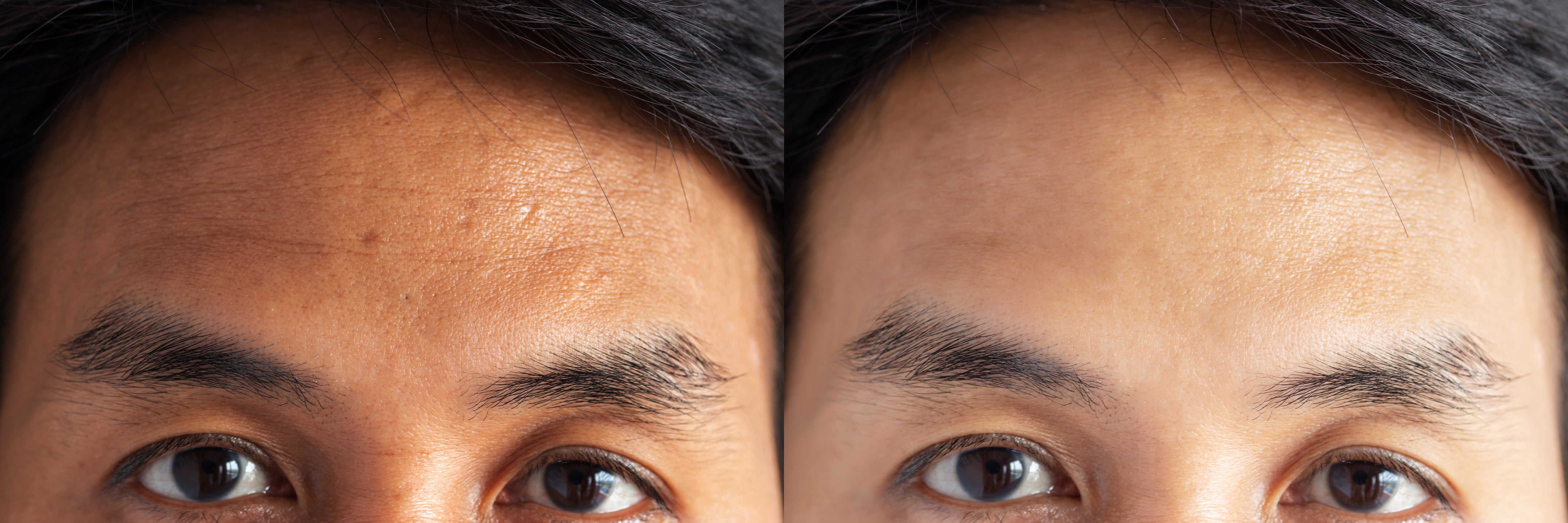Uneven pigmentation affects most people, regardless of ethnic background or skin color. Skin may either appear lighter or darker than normal; there may be freckling, dark brown spots, acne scars, age spots, blotchiness, uneven skin tone, dark brown patches and/or sun damage.
Facts About Skin Lighteners and Brighteners:
Today’s skin pigmentation issues can be treated by using topical skin lighteners that inhibit melanin production, meaning that it prevents the skin from making the substance responsible for our skin color. These skin lightening treatments may contain hydroquinone, the most aggressive topical lightening ingredient as well as others that include, Kojic Acid and/or Alpha Arbutin.
Other potential skin lighteners are Licorice Extract (specifically Glabridin), azelaic acid, and stabilized Vitamin C (10-22% known as L- Ascorbic Acid, Ascorbic Acid, Ascorbyl Glucoside and magnesium Ascorbyl Phosphate). They act as direct inhibitors of tyrosinase, an enzyme in the skin pigment cells (known as melanocytes) that is responsible for making melanin.
Topical Hydroquinone is considered by many dermatologists to be a safer, similarly effective and less expensive option than lasers or deep peels.
Sometimes deep chemical peels are necessary for consumers who have melasma. Topical Hydroquinone comes in 2% (available in cosmetics) to 4% or more- (available from a physician or by prescription) or in combination with tretinoin (available in a prescription).
Research has shown Hydroquinone and Tretinoin (vitamin a derivative) to be a powerful combined treatment against sun damage or hormone induced melasma.

Skin Conditions:
Hyperpigmentation is increased melanin production - is often referred to as melasma or solar lentigenes.
Aside from sun exposure and hormonal imbalance, hyperpigmentation can be caused by skin damage, such as acne scars, wounds and /or rashes. This is especially true for those with darker skin tones. The most typical cause of darkened areas of skin, brown spots or areas of discoloration is unprotected sun exposure.
Melasma is generally used to describe skin discolorations caused by hormones. These hormonal changes are usually the result of pregnancy, birth control pills or estrogen replacement therapy.
Solar lentigens is the technical term for darkened spots on the skin caused by the sun. Solar refers to sunlight and lentigene refers to a darkened area of skin. These spots are quite common in adults with a long history of unprotected sun exposure.
Melanin has two major forms that combine to create varying skin tones. Eumelanin produces a range of brown skin and hair color, while pheomelanin produces a yellow to reddish hue.
Melanin provides some amount of sun protection for the skin by absorbing ultra violet light and darker skin colors are less susceptible to sunburn and the overall effects of sun damage. However, no matter what skin color, sunscreen is a must!
Difference between Lighteners vs. Brighteners:
Skin Brighteners do not actually lighten your skin in any way. They are basically products that enhance the texture of your skin. Anything that promises a glow or radiance is a skin brightener. Peels and exfoliants can be thought of as skin brighteners. Results from skin brighteners are much different than that of lighteners, in that they are very mild. There is no lightening up in terms of shades, just a glow and an overall radiance.
Skin Lighteners decrease the amount of melanin in your skin. They usually contain a potent concentration of lightening actives that fade dark spots and even out skin tone by inhibiting or altering melanin synthesis.
Mitchell Group’s newest brand is called OMIC LightenUp designed to restore clear, flawless skin aggressively but safely. It is now being used by celebrities like Johnny Depp and Robert Downey Jr.
LightenUp PLUS Active Lightening Cream and New York Fair & Lovely Gel PLUS, designed for those consumers who have an urgent need to minimize discoloration and achieve an overall more even, radiant and healthy-looking complexion.
LightenUp PLUS Brand is our innovative collection that offers high performance, targeted treatments without the need for a prescription or a doctor’s appointment.





Share:
Does it REALLY matter if I use sunscreen?!